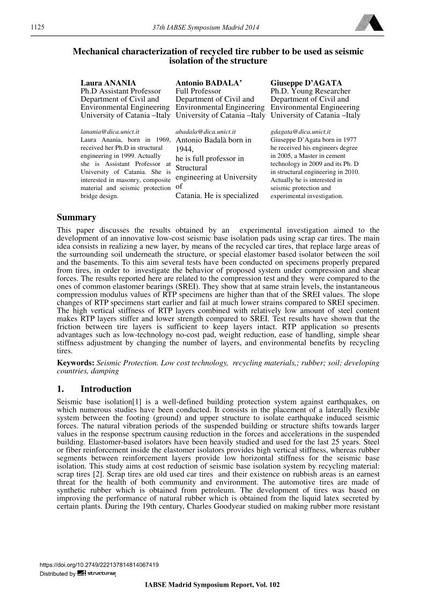Mechanical characterization of recycled tire rubber to be used as seismic isolation of the structure

|
|
|||||||||||
Bibliographic Details
| Author(s): |
Laura Anania
Antonio Badalá Giuseppe D'Agata |
||||
|---|---|---|---|---|---|
| Medium: | conference paper | ||||
| Language(s): | English | ||||
| Conference: | IABSE Symposium: Engineering for Progress, Nature and People, Madrid, Spain, 3-5 September 2014 | ||||
| Published in: | IABSE Symposium Madrid 2014 | ||||
|
|||||
| Page(s): | 1125-1131 | ||||
| Total no. of pages: | 7 | ||||
| Year: | 2014 | ||||
| DOI: | 10.2749/222137814814067419 | ||||
| Abstract: |
This paper discusses the results obtained by an experimental investigation aimed to the development of an innovative low-cost seismic base isolation pads using scrap car tires. The main idea consists in realizing a new layer, by means of the recycled car tires, that replace large areas of the surrounding soil underneath the structure, or special elastomer based isolator between the soil and the basements. To this aim several tests have been conducted on specimens properly prepared from tires, in order to investigate the behavior of proposed system under compression and shear forces. The results reported here are related to the compression test and they were compared to the ones of common elastomer bearings (SREI). They show that at same strain levels, the instantaneous compression modulus values of RTP specimens are higher than that of the SREI values. The slope changes of RTP specimens start earlier and fail at much lower strains compared to SREI specimen. The high vertical stiffness of RTP layers combined with relatively low amount of steel content makes RTP layers stiffer and lower strength compared to SREI. Test results have shown that the friction between tire layers is sufficient to keep layers intact. RTP application so presents advantages such as low-technology no-cost pad, weight reduction, ease of handling, simple shear stiffness adjustment by changing the number of layers, and environmental benefits by recycling tires. |
||||
| Keywords: |
soil damping developing countries seismic protection rubber recycling materials low cost technology
|
||||
